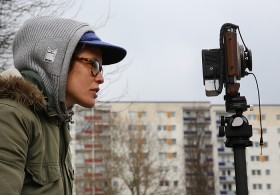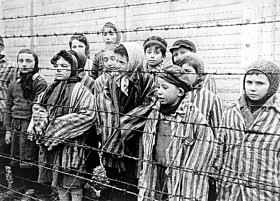
Hadas Tapouchi © Katja Täubert
History cannot be captured in a single form. Not in brass, not in metal. That is what Hadas Tapouchi says. The Berlin-based Israeli artist believes that monuments and inscriptions miss the actual sense of commemoration. This type of remembrance would be an inevitable path towards forgetting.
Undoubtedly, Hadas works against forgetting. Upon our first meeting at her Tel Aviv apartment about four years ago, the artist’s rendered self-portrait in prisoner’s garb immediately jumped out at me. It was one of the precursors to her project, “The Third Generation“. A countless number of portraits since followed – portraits of mutual friends, the author himself, as well as young men and women between Berlin, Tel Aviv and Ramallah. → continue reading

View of Jewish Musem-Berlin storage,© Jewish Museum Berlin, photo: Jens Ziehe
It’s cold. The neon light casts a harsh glare. A gray cabinet stands next to another along white walls. The room feels sterile. The air conditioning hums. A gloomy place.
I put on blue, latex gloves, open one of the cabinets and take out a gray carton. Contours of an item shimmer from under layers of tissue paper. Carefully, I take the object out of the carton and free it from the paper; a microcosm of history presents itself, as if this gloomy place accentuates the aura of the item, the room itself taking a whole step back. → continue reading

Surviving children in the main concentration camp, Auschwitz. This still from documentary footage shot by Alexander Voronzow shows Tomasz Szwarz, Alicja Gruenbaum, Solomon Rozalin, Gita Sztrauss, Wiera Sadler, Marta Wiess, Boro Eksztein, Josef Rozenwaser, Rafael Szlezinger, Gabriel Nejman, Gugiel Appelbaum, Mark Berkowitz, Pesa Balter, Rut Muszkies, Miriam Friedman, and Miriam and Eva Mozes. Licensed for the public domain by the United States Holocaust Memorial Museum.
Seventy years ago to this day, the Soviet Army liberated the death camps Auschwitz I and II. Almost ten years ago, the anniversary was designated International Holocaust Remembrance Day. Although I’ve been reflecting on representations of the Holocaust in art, literature, and philosophy for many years, I remain irritatingly little affected by today’s date, January 27. In most European countries, official events will once again collectively recall that breach of civilization and commemorate those who were systematically murdered. So too will Germany. Here, the decision to officially commemorate the victims of the Holocaust on this day was reached in 1996—not least because → continue reading


